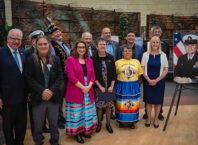As the Canadian federal government prepares to introduce its budget, the Council of Canadians is calling for the allocation of significant resources to protecting the Great Lakes as a Commons, a Public Trust and a Protected Bioregion. The Council of Canadians outlines how and why in a new report entitled Our Great Lakes Commons: A People's Plan to Protect the Great Lakes Forever.
"The Great Lakes crisis is part of the global crisis, in which we are quickly running out of fresh water," says Council of Canadians chairperson Maude Barlow, author of the report. "It's not a closed hydrological cycle like we were taught – we are losing clean water through irrigation, bottled water, virtual water trade and more."
"The Great Lakes crisis is part of the global crisis, in which we are quickly running out of fresh water," says Council of Canadians chairperson Maude Barlow, author of the report. "It's not a closed hydrological cycle like we were taught – we are losing clean water through irrigation, bottled water, virtual water trade and more."
Our Great Lakes Commons is a call to understanding and to action on a proposal to designate the Great Lakes and its tributary waters as a lived Commons: to be shared, protected, managed and enjoyed by all who live around them.
The Great Lakes Basin Commons would need to be protected by a legal and political framework based on Public Trust Doctrine, underpinning in law that the Great Lakes are central to the very existence of those people, plants and animals living on or near them and therefore must be protected for the common good from generation to generation.
"It's time for the [Canadian] federal government to step up their commitment to restoring the Great Lakes," says Council of Canadians national water campaigner Emma Lui, "The Obama administration had originally proposed $475 million for Great Lakes clean up, even the Republican party supported $225 million for the Restoration Initiative. In the last budget, the [Canadian] Harper Government allocated a mere $8 million to protect the Great Lakes. The federal government needs to increase funding significantly in order to protect the Great Lakes as a commons, public trust and protected bioregion."
In the water chapter in the Alternative Federal Budget, the Council of Canadians calls for $3.375 billion in new funding over five years, to clean up polluted lakes and rivers, protect Canada's waterways from invasive species, and to clean-up the Great Lakes.
"Scientists say that the Great Lakes could be bone dry in 80 years," Barlow adds, citing the case of the Aral Sea, the fourth largest lake in the world, but now just 10 percent of its former size. "The World Bank says that water demand is outstripping supply by 40%, producing great suffering."
The long-term goal of the network proposing the Great Lakes Basin Commons, which includes the Council of Canadians, On the Commons, and Food & Water Watch is to eventually see a full treaty between Canada and the United States that declares the Great Lakes to be a lived Commons, Public Trust and Protected Bioregion, one that is also adopted by the states, provinces and First Nations of the Basin.
The Council of Canadians formed in 1985 to bring Canadians together to act for social, economic and environmental justice in Canada and around the world.
The report is available online at: www.canadians.org/water.
The Great Lakes Basin Commons would need to be protected by a legal and political framework based on Public Trust Doctrine, underpinning in law that the Great Lakes are central to the very existence of those people, plants and animals living on or near them and therefore must be protected for the common good from generation to generation.
"It's time for the [Canadian] federal government to step up their commitment to restoring the Great Lakes," says Council of Canadians national water campaigner Emma Lui, "The Obama administration had originally proposed $475 million for Great Lakes clean up, even the Republican party supported $225 million for the Restoration Initiative. In the last budget, the [Canadian] Harper Government allocated a mere $8 million to protect the Great Lakes. The federal government needs to increase funding significantly in order to protect the Great Lakes as a commons, public trust and protected bioregion."
In the water chapter in the Alternative Federal Budget, the Council of Canadians calls for $3.375 billion in new funding over five years, to clean up polluted lakes and rivers, protect Canada's waterways from invasive species, and to clean-up the Great Lakes.
"Scientists say that the Great Lakes could be bone dry in 80 years," Barlow adds, citing the case of the Aral Sea, the fourth largest lake in the world, but now just 10 percent of its former size. "The World Bank says that water demand is outstripping supply by 40%, producing great suffering."
The long-term goal of the network proposing the Great Lakes Basin Commons, which includes the Council of Canadians, On the Commons, and Food & Water Watch is to eventually see a full treaty between Canada and the United States that declares the Great Lakes to be a lived Commons, Public Trust and Protected Bioregion, one that is also adopted by the states, provinces and First Nations of the Basin.
The Council of Canadians formed in 1985 to bring Canadians together to act for social, economic and environmental justice in Canada and around the world.
The report is available online at: www.canadians.org/water.






